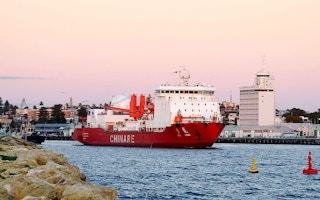Antarctica’s early history was marked by national rivalries – think of Britain and Norway racing to the South Pole in 1911. But since the signing of the Antarctic Treaty in 1959, collaboration has become more important than competition. And the relationship between Australia – Antarctica’s biggest territorial claimant – and China, the emerging superpower, is among the most crucial of all.
One of Australia’s key aims, as set out in its Antarctic Strategy and 20 Year Action Plan, is to strengthen the existing Antarctic Treaty system, by “building and maintaining strong and effective relationships with other Antarctic Treaty nations through international engagement”.
As Australia’s largest trading partner and a significant player in Antarctica, China is a crucial nation with which to engage if Australia is to meet its objectives. This raises the question of how the two countries might fruitfully cooperate in Antarctica over the next 20 years.
Existing ties
China began its first scientific expedition to Antarctica in 1984. It now has four Antarctic bases, two on Australian-claimed territory.
Australia and China’s Antarctic ties have thus been evolving for more than three decades, with a focus on science, logistics and operations. Bilateral relations seem to have strengthened in recent years.
In 2014, President Xi Jinping visited Hobart and signed a memorandum of understanding with Australia to collaborate in Antarctica and the Southern Ocean.
Last year, Australia’s Antarctic Climate and Ecosystems Cooperative Research Centre signed an agreement with its Chinese counterpart, the National Marine Environmental Forecasting Centre, to develop new forecasting methods to aid the challenging task of navigating Antarctic sea ice.
February 2016 saw the inaugural meeting of the China-Australia Joint Committee on Antarctic and Southern Ocean Collaboration, which arose from the 2014 agreement.
But it has not all been smooth sailing. China has strongly opposed Australia’s proposal to establish a network of marine protected areas off East Antarctica.

Proposed marine parks off East Antarctica. Image: Australian Antarctic Division
Australia is also concerned about China’s presence in Antarctica. For example, a news article at the time of Xi’s 2014 visit suggested that “China may eventually try to overthrow the Antarctic Treaty system underpinning Australia’s claim to 43% of the frozen continent”, while questions have been asked about the scope of China’s mining ambitions on the frozen continent.
“
With Antarctica now also on the radar for China’s richer tourists, Australia could not only benefit economically but must also work closely with China to develop regulations that prevent this nascent industry from damaging the Antarctic environment.
John Smith
Potential future collaborations
There are several reasons, however, to expect that China and Australia can put aside their diplomatic differences in pursuit of Antarctic science.
First, it seems more likely that China will continue to endorse the Antarctic Treaty than to undermine it. As a rising power, China has growing interests in the Southern Ocean but it has no territorial claim in Antarctica. It would certainly not be at the front of the queue in the ensuing land grab if the treaty were to end.
Realistically, China should therefore continue to support the treaty, under which the seven existing national claims (plus any prospective claim by the United States, which has a research base at the South Pole) are suspended.
This logic is backed up by China’s behaviour with regard to the even more politically fraught North Pole. By becoming an observer of the Arctic Council, China has opted to embrace rather than challenge the current Arctic regime, despite the jockeying among Arctic nations over territorial rights.
Second, to maintain Australia’s leadership and excellence in Antarctic science, it will need to collaborate with industry and other nations. As an economic powerhouse, China has both the funding and the technology to deliver things like icebreaker ships, a well as a keen interest in Antarctica, which should extend to long-term scientific collaborations.
Third, Australia wants to maintain its leadership in environmental stewardship of Antarctica. One current hurdle seems to be China’s opposition to Australia, France and the European Union over the planned marine protected areas off East Antarctica. As the world’s largest fishing nation, China’s reluctance to support “no-take zones” is hardly surprising.
Nevertheless, this issue could potentially be converted from obstacle to opportunity, perhaps by Australia inviting Chinese scientists to conduct joint scientific research in these areas of the Southern Ocean. This would not only improve understanding of unknown marine ecosystems, but would also be a useful way for Australia to exert diplomatic “soft power”.

Antarctica is increasingly attractive to the more affluent of China’s tourists. Image: Butterfly voyages/Wikimedia Commons, CC BY-SA
Finally, Australia has its own economic interests in Antarctica, such as sustainable fishing and tourism. Meanwhile, ever greater numbers of Chinese tourists are venturing abroad, with visits to Australia passing the 1 million mark last year. With Antarctica now also on the radar for China’s richer tourists, Australia could not only benefit economically but must also work closely with China to develop regulations that prevent this nascent industry from damaging the Antarctic environment.
All of this means we can reasonably expect Australian-Chinese ties to grow ever closer over the next two decades – even in the world’s remotest place.
This article is part of a series on Australian science and diplomacy in Antarctica. Look out for more articles in the coming days.
![]()
Nengye Liu is senior lecturer in law, University of New England. This article was originally published on The Conversation.











